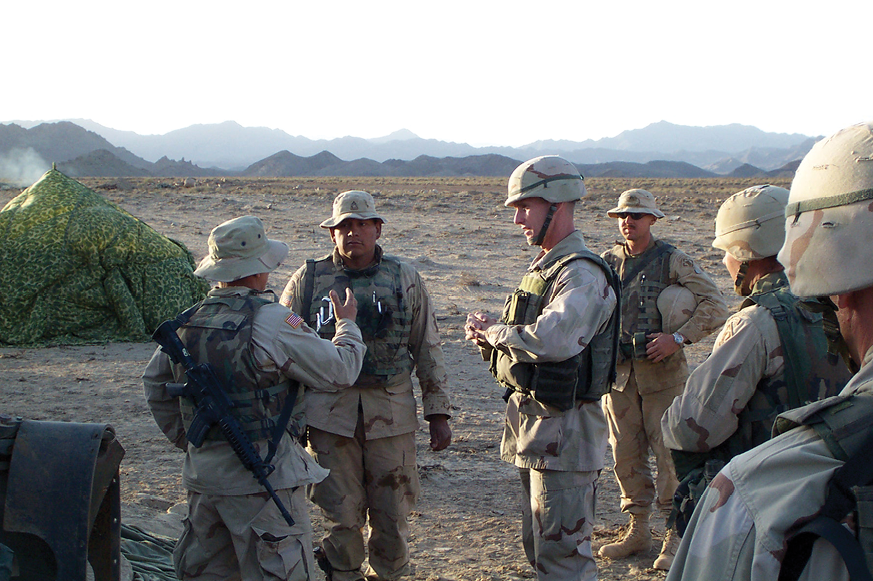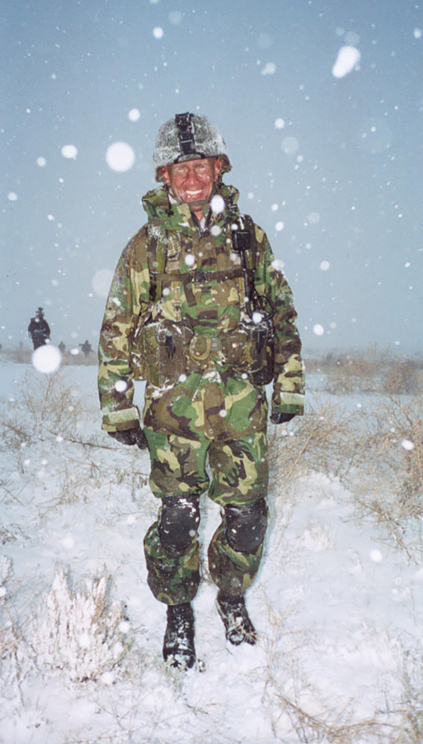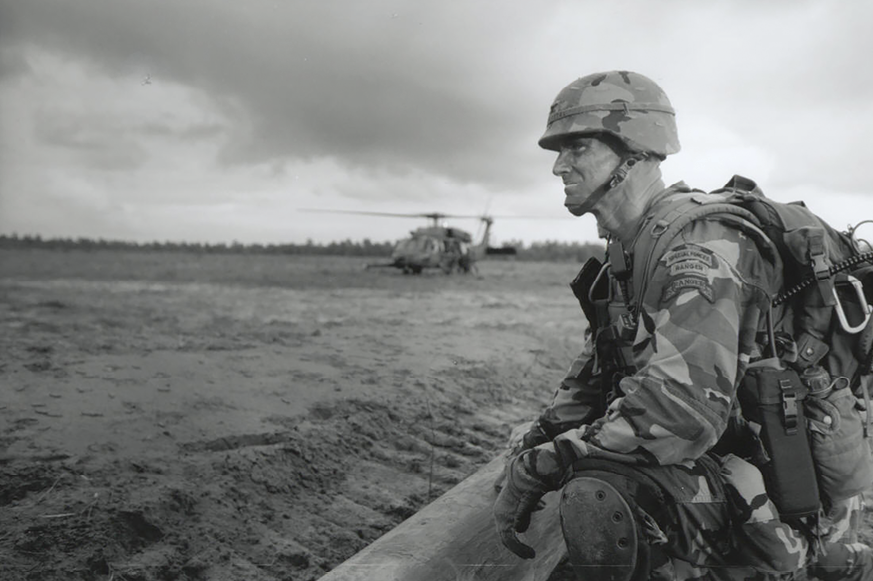- Home
- Media Kit
- MediaJet
- Current Issue
- Past Issues
- Ad Specs-Submission
- Reprints (PDF)
- Photo Specifications (PDF)
- Contact Us
- PRIVACY POLICY
- TERMS OF USE
![]()
ONLINE
![]()
ONLINE

A Life Of Service
Editors’ Note
Stanley McChrystal founded McChrystal Group in January 2011 to deliver innovative leadership solutions to businesses globally to help them transform and succeed in challenging, dynamic environments. As founder and chairman, he advises executives at multinational corporations on navigating complex change and building stronger teams. A retired four-star general, McChrystal is the former commander of U.S. and International Security Assistance Forces (ISAF) Afghanistan and the former commander of the nation’s premier military counter-terrorism force, Joint Special Operations Command (JSOC). He is best known for developing and implementing a comprehensive counterinsurgency strategy in Afghanistan, and for creating a cohesive counter-terrorism organization that revolutionized the interagency operating culture. Throughout his military career, McChrystal commanded a number of elite organizations, including the 75th Ranger Regiment. After 9/11 until his retirement in 2010, he spent more than six years deployed to combat in a variety of leadership positions. In June 2009, the President of the United States and the Secretary General of NATO appointed him to be the Commander of US Forces Afghanistan and NATO ISAF. His command included more than 150,000 troops from 45 allied countries. On August 1, 2010 he retired from the U.S. Army. In 2013, McChrystal published his memoir, My Share of the Task, a New York Times bestseller; and is an author of Team of Teams: New Rules of Engagement for a Complex World, also a New York Times bestseller in 2015. McChrystal most recently authored his latest book, On Character, offering thought-provoking reflections on the discipline required to live up to our beliefs. The book was an instant New York Times bestseller. He previously served as a senior fellow at Yale University’s Jackson Institute for Global Affairs, where he also taught a course on leadership. He currently sits on the boards of General Atomics, Allegiance and Ascendance Trucks, and the FENIX Group. He is a sought-after speaker, giving speeches on leadership and team dynamics to organizations around the country. A passionate advocate for national service and veterans’ issues, McChrystal is the Chair of the Board of Service Year Alliance. In this capacity, he advocates for a future in which a year of full-time service – a service year – is a common expectation and opportunity for all young Americans. McChrystal is a graduate of the United States Military Academy at West Point and the Naval War College. He also completed year-long fellowships at Harvard’s John F. Kennedy School of Government and the Council on Foreign Relations.

General Stanley McChrystal visiting
FLS Carlson in 2004
Will you discuss your career journey, and when you knew that you were interested in public service?
That is an interesting question because I wanted to be like my father from the earliest age I could remember, so I wanted to be a soldier like him, but I didn’t think of it as public service. I thought of it as emulating him. Even when I went into West Point when I was 17 years old, I was thinking much more about an interesting career that was attractive to me. It actually wasn’t until later in my career that I started to think about being a soldier as being real public service, and started to see the difference between the opportunities in the military or government as opposed to what people could make on the outside. I’m not saying that I felt sorry for myself, but I started to frame my decision on more than just money – I wanted to align myself to something that adds value in a way I can be proud.
How much did your military experience shape your views on leadership and the way you lead?
I think it would be wrong to say it didn’t shape it primarily, but to say that everybody in the military is shaped the same just doesn’t recognize reality since the military is so big and provides so many different experiences. So, the particular way I lead was representative of first, the general idea of the military based on values, structure, discipline – pretty traditionally recognized things. But then part of the way through my career when I went into special operations, I got into things that were much more unconventional, much more bottom up rather than top down, and much more decentralized, so my leadership style evolved with that. In some cases, I like to tell myself that I helped the organizations I was involved with to evolve, but clearly being in that environment shaped me. It is how I think about leadership now.
“If you look at people who are very successful in what they do, almost anybody who succeeds in a really good way in any sector starts by being very committed and focused, and staying persistent in it and disciplined in it. My military career was over 34 years and there were times when it wasn’t fun, but a lot of that was brick by brick building enough expertise to be effective.”
When you look at the evolving challenges in the world, do you feel that the military is adapting and innovating to meet these challenges?
First, I don’t want to sound critical because it’s really hard to see forward in the military. People on the outside all claim they can, but nobody really can predict the future, and the military is always criticized for not getting it right, but it’s pretty understandable. If you think about armies historically, it started to become an organizational and discipline challenge, and whoever could get a better organization and then create standards for performance of individuals and groups tended to win. I think we are entering a period where two things can be true simultaneously. There is still a need in the military of a large nation to be really organized, but then on the other side of that, you need to have an extraordinarily innovative force that can get demand signals for what works in the battle, what is needed, and then have this relationship so that innovation can go all the way back to the people who are producing the weapons, creating the capabilities, training the force. So, I think we’re not going to go away from the need to be organized, but we are going to have to be much more adaptive than in the past because that speed of adaptation is so much quicker than it has been in previous wars.
How critical is it for schools to change the way they teach future soldiers to be prepared for the challenges of tomorrow?
I think it is critical. There will still be the need for principles, and there are principles in two ways. One principle relates to our values. The other is about the principles of war which turn out to be kind of timeless, but they’re interpreted differently on the battlefield. What we want now is when people are given new information, they bring imagination and do it at an extraordinary speed. You need this for people who are actually interacting with the enemy, but you also need to have it back through the entire force because if we think about it, the people up close to the enemy are going to naturally innovate. They are going to try something, and if it doesn’t work, they’re not going to do it again. I think that the kind of people who are going to do well in the military in the future are not solely guys with big biceps and a lot of courage, although there is a requirement for some of that. But there is a requirement for very innovative, quick thinkers who still have a complete commitment, a disciplined commitment to the cause.

General Stanley McChrystal at the Yakima Training
Center in
Washington State in January 1999
Do you feel that the talent that is needed for the future is coming into the military?
I think that generally, the military gets good talent. The key is creating a structure and a culture that maximizes the talent because you are only going to get a few really innovative, brilliant leaders, which is the nature of the beast. I think we are probably over-indexed right now on legacy things which is going to be less valuable in the future than someone who can work a keyboard really well, because as we’ve seen from Ukraine, people operating drones on the battlefield can be 85-year-olds in a wheelchair, and they would be just as effective as somebody else.
How do you balance the need to be a global leader with the concerns that the military will be stretched too thin?
If you look at the history of great empires, they tend to bankrupt themselves and often that’s done because they stretch so wide militarily that it’s unsustainable. On the other hand, I think the strength of the United States, particularly since the conclusion to the Second World War, came from the fact that we went from an isolationist policy in the 20s and 30s to being globalists. We thought we had to be for the Cold War, so we made that our policy, and it paid off in spades. We had interaction around the world economically, we had influence in places partly because our military reach and capability since we could provide support and defense for people, and that enabled us to be the global reserve currency because we were so powerful, and we’ve benefited from that. So, on one hand, I think that people say it costs too much, but on the other hand, I would argue it works extraordinarily well.
The challenge now is that we are trying to be everywhere, but we are also trying to do everything because the spectrum of our potential opponents goes from small non-state actors using cyber or potential terrorist activities, to well-funded state actors like China, and when you try to compete on that entire spectrum, you are trying to be good at it all the way across and that’s always going to be expensive and hard. I think we have to try to do that, but I think that the secret is we can’t do it alone. We have got to use alliances. We’ve got to leverage the capability of allies, which means we must have allies.

General Stanley McChrystal in action in
September of 1998
What was your vision for creating McChrystal Group, and how do you focus your efforts leading the organization?
I left the service studently in 2010, and I didn’t have a plan. A friend of mine asked me if I wanted to start a business, and I sort of reflexively said yes. While there wasn’t a plan to create McChrystal Group when I was on active duty, we created it and it became a consulting firm. I think in the first few years, although we started working with firms to make them better, I am not sure we had the clarity of why we were doing it. However, as we got more involved inside of firms, we realized there was this great need out there for firms to be able to operate like a team of teams, which is one of the lessons we learned from the counterterrorist fight. It was about three or four years into the company that we became not just a business, but also became a real purpose-driven effort because I believe strongly that there are a lot of organizations that are operating much less effectively than they could, and it’s not for a lack of resources or talent. It’s just because the way they function doesn’t unlock the capability, and that’s the value we offer.
What do you look for when hiring talent for McChrystal Group?
When we first started, you hire people you know, so I hired a bunch of people out of special operations which was great, but many of them were at a point in life where they didn’t want to work many more years, so there was some attrition there. Now, what we look for is a diversity of talent, which means across different ages and genders and backgrounds, and what I do look for increasingly is commitment. We found that if you really want to get organizations to change, you must be passionate and focused because you’re trying to convince another organization that you don’t run to do something that they aren’t doing now. So, I’m not going to say we don’t look for the best talent. We look for good talent, but I think the dominant thing is if somebody is really committed to being part of a team that is going to make a difference.
What led to your interest in writing books?
When I was younger, I always liked to read so I talked about one day possibly writing a book, but when I left the service in 2010 I had no plans to write. I was then asked to write my memoirs and was convinced that I should, so I wrote my memoirs which took me two and a half years. It was very eye-opening because in writing your memoirs, you think you know the story because you were there, but the reality is that you only know a small part of the story because there are all these other things happening. It was a bit of a harrowing experience to write your own story and realize that you are not the star, but it also opens up the idea of what history is. My publisher came to me after the memoirs and said, there’s an interesting book story inside your memoirs and it needs to be expanded, and that was the team of teams idea. We wrote Team of Teams as the second book to capture what we had learned and explain it, and that was a lot of fun to write. We came up with that in 2015 and, at that point, we sort of had the bug. After Team of Teams which has done extraordinarily well, we then wrote Leaders, which is the study of thirteen leaders since I really enjoy history. We then wrote a book called Risk, and most recently wrote a book called On Character because, at this stage in my life, I wanted to address it since it is increasingly important.
I enjoy writing, but it also forces me to think. It’s not just a case of me putting on a page what I think about something. It requires me to make a journey to determine what I think about something and then as I do that, I go through this dialectic process, sort of pushing and pulling on my own thoughts. When you finally get it on the page, it can be eye-opening, and sometimes you think differently than you thought you did.
What advice do you offer to young people beginning their careers?
The opportunities are changing, but the fact that there are opportunities doesn’t change. One of the great things about being young right now is that many of the traditional things are being shaken up or erased, which means that opportunities are going to go to everybody. You are not going to be trying to get into this hierarchical economy where you have to start at the bottom and your parents have to be connected. There are going to be all kinds of opportunities.
I tell young people not to be intimated and to be opportunistic. But it is also so important to be committed. Step back and don’t just think about how you are going to make the most money – think about commitment to something. If you look at people who are very successful in what they do, almost anybody who succeeds in a really good way in any sector starts by being very committed and focused, and staying persistent in it and disciplined in it. My military career was over 34 years and there were times when it wasn’t fun, but a lot of that was brick by brick building enough expertise to be effective.
When you look to the future, what excites you the most, and what concerns you the most?
What excites me the most is that we have a very talented, young group coming up. Technology is going to provide the opportunity to scale with efficiency, so we are going to be able to educate people better, we are going to be able to keep people healthier.
On the other side, we have also got to look backwards. I say that because we have got to understand that the traditional things that can upend a civilization or a nation, most of them still ring true. We still can have the rise of autocratic regimes. We can have the loss of individual freedoms. We can have all of the things that previous generations faced, but they fought for freedom. They fought to protect civil rights. Those things aren’t done. I think all of those things, arguably, will be more important in the future than they have seemed in the past, but we tend to sometimes think that this only applies to people in history.![]()